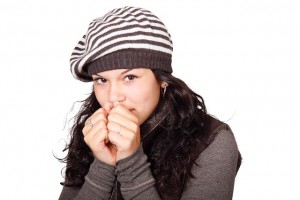to stand in the cold (suffering), to be extremely cold
[verb]
[blauw-bek-ken, blauw-bek-te, ge-blauw-bekt] ![]()
 ‘Blauwbekken’ is what you do when you’re standing outside in the cold shivering. However sometimes you can also use it in other situations, just to emphasize how cold you are!! The word ‘bek’ is slang for ‘mouth’ and sometimes even ‘face’. And I guess you can figure out ‘blauw’. If not, go outside without a jacket (if in NL) and come back in an hour 😉
‘Blauwbekken’ is what you do when you’re standing outside in the cold shivering. However sometimes you can also use it in other situations, just to emphasize how cold you are!! The word ‘bek’ is slang for ‘mouth’ and sometimes even ‘face’. And I guess you can figure out ‘blauw’. If not, go outside without a jacket (if in NL) and come back in an hour 😉
‘Blauwbekken’ is used colloquially.
Examples:
– “Dimiter, wat ben je laat man!”- “Ja, en ik heb het ook nog koud, ik heb een half uur staan blauwbekken bij de tramhalte omdat de tram niet kwam opdagen!”
(“Dimiter, you’re (really) late man!” – “Yeah, and I’m cold too, I stood in the cold for half an hour at the tramstop because the tram didn’t show!” Note that with the verb ‘blauwbekken’ it is not common to use the past participle, and one uses ‘staan’ instead which also indicates it was a prolonged activity.)
– “Het is om te blauwbekken zo koud!”- “Ach, stel je toch niet zo aan!”
(“It’s so cold it makes one ‘blauwbekken’ (‘turn blue’) !” – “Ah, don’t be a whimp!” Note the reflexive verb ‘zich aanstellen’ that you will hear used as in this example sentence but also variants such as ‘je stelt je aan!’. The related noun is ‘aansteller’. The first part of the example sentence shows the use of the common construction ‘het is om te [verb] zo [adjective]’: it’s so [adjective], it makes one [verb].)
– “Catharina, mag ik van jou een sjaal lenen, en misschien ook een trui?”- “Hoezo, ben je bang dat je anders gaat blauwbekken vanavond?”
(“Catharina, can you lend me a scarf, and perhaps also a jumper/sweater?” – “Why, are you afraid you will be standing in the cold tonight?” Lit.: “…can I borrow from you …”)
– “Het duurt gewoon heel lang voordat ik het warm krijg! Ik lig zelfs in bed onder twee dekens nog een tijd te blauwbekken!”
(“It just takes a very long time before I get warm! Even in bed under two blankets I’m still extremely cold for quite some time!”)
Related words:
– Kou(de): cold [noun] [de koude, <no plural>].
– Kou lijden: to suffer from the cold [verb] [leed kou, kou geleden].
– Bibberen: to shiver [verb] [bibberde, gebibberd].
– Rillen: to shiver, shudder [verb] [rilde, gerild].
– Klappertanden: to shiver with cold (with chattering teeth) [verb] [klappertandde, geklappertand].

hoi! ik heb een klein foutje gespot: de vervoeging van klappertanden is natuurlijk [klappertanrde, geklappertand]. groet, marko
en met klappertanrde bedoel ik natuurlijk klappertandde.
Hi Rkicma,
Bedankt voor het spotten van de fout, ik heb het verbeterd!